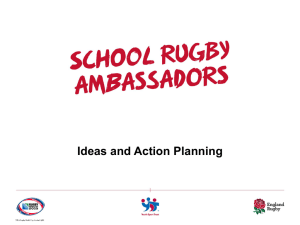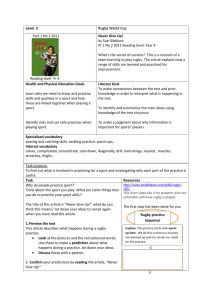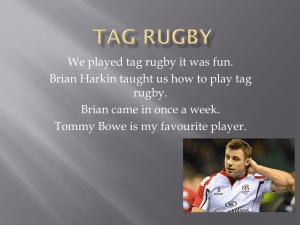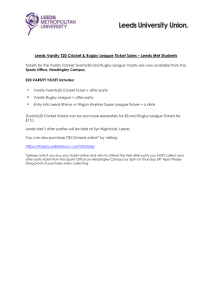A case of the Varsity Rugby Cup
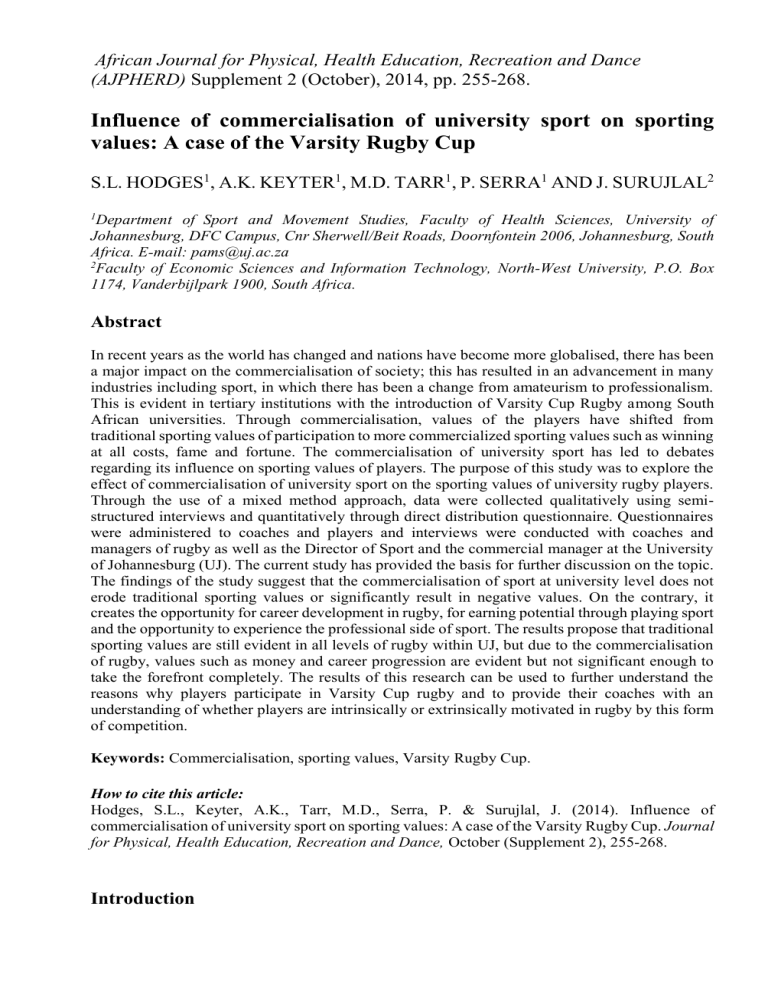
African Journal for Physical, Health Education, Recreation and Dance
(AJPHERD) Supplement 2 (October), 2014, pp. 255-268.
Influence of commercialisation of university sport on sporting values: A case of the Varsity Rugby Cup
S.L. HODGES
1
, A.K. KEYTER
1
, M.D. TARR
1
, P. SERRA
1
AND J. SURUJLAL
2
1 Department of Sport and Movement Studies, Faculty of Health Sciences, University of
Johannesburg, DFC Campus, Cnr Sherwell/Beit Roads, Doornfontein 2006, Johannesburg, South
Africa. E-mail: pams@uj.ac.za
2 Faculty of Economic Sciences and Information Technology, North-West University, P.O. Box
1174, Vanderbijlpark 1900, South Africa.
Abstract
In recent years as the world has changed and nations have become more globalised, there has been a major impact on the commercialisation of society; this has resulted in an advancement in many industries including sport, in which there has been a change from amateurism to professionalism.
This is evident in tertiary institutions with the introduction of Varsity Cup Rugby among South
African universities. Through commercialisation, values of the players have shifted from traditional sporting values of participation to more commercialized sporting values such as winning at all costs, fame and fortune. The commercialisation of university sport has led to debates regarding its influence on sporting values of players. The purpose of this study was to explore the effect of commercialisation of university sport on the sporting values of university rugby players.
Through the use of a mixed method approach, data were collected qualitatively using semistructured interviews and quantitatively through direct distribution questionnaire. Questionnaires were administered to coaches and players and interviews were conducted with coaches and managers of rugby as well as the Director of Sport and the commercial manager at the University of Johannesburg (UJ). The current study has provided the basis for further discussion on the topic.
The findings of the study suggest that the commercialisation of sport at university level does not erode traditional sporting values or significantly result in negative values. On the contrary, it creates the opportunity for career development in rugby, for earning potential through playing sport and the opportunity to experience the professional side of sport. The results propose that traditional sporting values are still evident in all levels of rugby within UJ, but due to the commercialisation of rugby, values such as money and career progression are evident but not significant enough to take the forefront completely. The results of this research can be used to further understand the reasons why players participate in Varsity Cup rugby and to provide their coaches with an understanding of whether players are intrinsically or extrinsically motivated in rugby by this form of competition.
Keywords: Commercialisation, sporting values, Varsity Rugby Cup.
How to cite this article:
Hodges, S.L., Keyter, A.K., Tarr, M.D., Serra, P. & Surujlal, J. (2014). Influence of commercialisation of university sport on sporting values: A case of the Varsity Rugby Cup. Journal for Physical, Health Education, Recreation and Dance, October (Supplement 2), 255-268.
Introduction
256 Hodges, Keyter, Tarr, Serra and Surujlal
Sport, which was once an amateur activity, has transformed into a multi-billion rand industry during the past two decades (Schaaf, 2004). Along with this transformation came several changes which are in stark contrast to what sport once stood for. During the days of the Ancient Olympics which occurred at a time when sport was an amateur activity, values such as physical well-being, education through better understanding, harmony, peace, respect for others and sportsmanship were important (Katie, 2012). Sport was all about the honorable pursuit of victory by playing within the spirit of the rules. It was recognised as the vehicle to reinforce values such as honesty, fair play, teamwork and fun. During the era of amateur competition, sport was used for the establishment of a peaceful society that preserved and nurtured human dignity and was about creating an organised system within society which had shared values. It was about participating for the wellness benefits as well as the values and the character that people gained as a result of participating in sport as opposed to focusing on just non-moral values such as money (FASANOC, 2013). Sport promoted socialisation through which adolescents were taught values of good citizenship as well as social inclusion (Houlihan & Green, 2011).
The evolution of sport from amateur ideals into a full blown commercial enterprise as a result of improvement in technology and societal demands has had a major impact on the commercialization process of sport (Connor & Mazanov, 2010).
According to Schaaf (2004), the commercialisation of sport has resulted in sport having a greater worth than the food and electronics industry. Sport now focuses on the market requirements and is used as a means for those with power to be favoured and to make decisions based on their wealth (Schaaf, 2004).
There has been an explosive growth in the sports marketing, sponsorship, sports tourism and consultancy sectors in sport. While significant economic and financial benefits have accompanied this growth, there has been huge concern regarding the negative repercussions with critics voicing that Olympic values were being traded for financial reward. Not only have sport teams become tradeable, athletes themselves have become marketable commodities which use sport to develop their own image and brand (Connor & Mazanov, 2010). Through their own brand and image coupled with the fame attached to success, athletes are able to secure lucrative sponsorships and endorsements. Media coverage on sport is currently more than it ever was with improved technology making it accessible anywhere through print media, broadcast media and mobile technology. In this way, athletes, teams and sponsors are constantly in the media.
Among the different important role players in commercial sport are the athletes.
Their behaviour and performance are under continuous examination and scrutiny by their fans, sponsors, team management and opposition (Connor & Mazanov,
2013). With the increased focus and expectations placed on them as well as huge monetary investment athletes experience tremendous pressure to deliver on the
Influence of commercialisation of university sport on sporting values 257 sport field. Athletes, being aware of the high competition for a place on the team and potential loss of earnings if they do not perform to expectations, are therefore driven towards acts that compromise the values that sport stands for.
Values associated with sport are affected when external factors try to influence the basic values (Katie, 2012). These external factors do not only impact on current values but also change future values. The commercialisation of sport has many negative values associated with it. Among these is the change in attitude of athletes. Instead of participating for the fun and love of the game, they play for money. Match-fixing has increased. Respect for other athletes has taken a back seat – this is evident in the high amount of sledging and conflict among players during cricket matches. In addition, the lure of fame and money has encouraged athletes to use performance-enhancing drugs. On the other hand, the commercialisation of sport has had positive outcomes. Among these are increase participation and spectatorship of sports. The commercialisation of sport has resulted in the proliferation of many commercial sport enterprises, thereby increasing opportunities for employment. Through hosting mega-events the avenue is created to showcase a country and its people.
Elite athletes now have the opportunity to perform on the world stage and for them to ensure success they are often required to adopt and promote certain values such as ethics, fair play, honesty and sportsmanship that will ensure this (Pipe & Hebert,
2008). The ethical dilemma of commercialisation occurs when winning as well as the expectations of winning become more important than the athletes themselves.
This may result in athletes displaying deviant behaviour in order to achieve this
(Connor & Mazanov, 2010). There is immense pressure placed on athletes these days to perform, to meet the expectation that individuals set for themselves as well as the expectations that fans set on teams. This pressure can influence players in either a positive or negative way. Therefore, in order to control the pressure players have to find the best method to help them deal with it before they turn to deviant behaviour to manage it (Marks, 2013). However, athletes who become skilled at controlling this pressure and redirect it into their performance and train at the same intensity and pressure as their opponents are those who will triumph into the top athletes (Marks, 2013).
Varsity Rugby Cup
The Varsity Cup rugby tournament, which is an example of the commercialisation of varsity rugby, was founded in 2008, featuring the rugby teams of eight universities. It is viewed as South Africa’s version of the Super Bowl in the United
States of America (USA). The universities that currently participate in this competition are the University of Pretoria (TUKS), University of Johannesburg
(UJ), University of Stellenbosch (Maties), University of Free State (Shimlas),
North West University (NWU-PUKKE), University of Cape Town (IKEYS), Wits
258 Hodges, Keyter, Tarr, Serra and Surujlal
University (WITS) and Nelson Mandela Metropolitan University (NMMU). This competition was introduced by the founders Duitser Bosman and Francois Pienaar in order to promote the game of rugby at amateur level so that a pool of potential players could be identified by the South African Rugby Union (SARU) for possible selection to the higher ranks in rugby, such as Super 15 and national squads.
Problem statement
Due to the nature of the Varsity Cup competitions and because of the fact that it is broadcast on national television, amateur players have begun leaning towards professionalisation believing that there is more at stake than just participating (Del
Carme, 2013). This may result in a change in their values and their behaviour.
Being in the limelight may influence their play and cause them to behave in the manner the public wants to see. In order to increase the entertainment value of the game they may be tempted to play contrary to their natural playing style. Research on the Varsity Rugby is sparse. To the authors’ best knowledge no research has been conducted to investigate the effect of commercialisation of varsity rugby on the sporting values of university rugby players. The purpose of this study is therefore to explore the effect of commercialisation of university sport on the sporting values of university rugby players.
Methodology
Design
The research design that was used was a case study with a mixed-methods sequential explanatory approach. The mixed-methods sequential explanatory design is highly popular among researchers and implies collecting the data in two distinct phases. In this study the quantitative data were first collected and analysed and then the qualitative research was conducted.
The rationale for this approach is that the quantitative data analysis was expected to provide a general understanding of the phenomenon being researched.
Subsequently, the qualitative data analysis was expected to provide support and refinement of the statistical results by exploring participants’ views in more depth
(Creswell, 2003).
Sample
The participating sample for this research was UJ male rugby teams, specifically the Varsity Cup team (n=18), 2 nd
team (n=21) and a residence team (n=11). In
Influence of commercialisation of university sport on sporting values 259 order to achieve the study objective a purposive sampling technique was used.
This technique allows the researchers to access critical and rich information from participants who have first-hand knowledge of the phenomenon being researched
(Patton, 2002).
Instrument and procedures
A direct distribution questionnaire was developed to collect data from the identified sample. One section of the questionnaire requested demographic information as well as motives for participation from the participants. With regard to the values associated with playing Varsity Rugby participants were requested to rank the following aspects in order of the importance: financial gain, teamwork, fame, career progression, sportsmanship and friendship/social aspects.
Participants were also requested to respond positively or negatively to the visibility of the following in Varsity Cup rugby: cheating, career progression, illegal substance use, foul play, recruitment opportunities and supplementation.
With regard to how Varsity Cup rugby impacted on Varsity rugby, participants were requested to respond positively or negatively to the following aspects: increased discipline, more fighting on the field, improved teamwork, increased opportunity for career progression, increased pressure and more practice sessions.
Questionnaires were distributed by three Sport Management Honors students to the three teams immediately after their training sessions, and were collected immediately after they were completed. With regard to the qualitative study, the head of rugby, manager of sport, the head of commercialisation of sport at UJ and the respective captains of the Varsity Cup, 2 nd
team and residence team, were contacted and appointments made to interview them. Seven (n=7) semi-structured interviews lasting 20-25 minutes each were conducted. In addition to the interviewer two Sport Management Honors students were present to assist in taking field notes during the interview. Participants were requested to answer questions on the following issues: motive to play rugby, the evidence of traditional sporting values, the influence of commercialisation on traditional values, the pressure players experienced playing at Varsity Cup rugby level, behaviour of players playing at Varsity Cup level compared to players at other levels and sporting values of players at different levels.
Data analysis
The questionnaires were analysed using the Statistical Package for the Social
Sciences (SPSS – Version 21). Descriptive statistics and frequencies were used to report on the quantitative data. With regard to the qualitative study, the field notes
8
6
4
2
0
260 Hodges, Keyter, Tarr, Serra and Surujlal taken during the interviews were coded and analysed using the Atlas-ti software package.
Ethical considerations
Prior to conducting the study, permission was requested from the UJ Sports club manager as well as the rugby manager. After permission was granted, consent was obtained by the head of rugby at UJ as well as the coaches from each team to administer questionnaires to the players as well as to conduct interviews with the respective managers at the UJ Sport Bureau. All participants in the study were assured of confidentiality and anonymity and were informed that their participation was voluntary. They were also informed that the results would be used for research purposes only.
Results
Demographics
The demographic profiles of the participants are provided in Figure 1.
16
14
14
18-20
12
21-23 24-25
12
10
10
4 4
3
1 1
0 0
1
0
White Black Coloured Other
Figure 1: Demographic profiles of participants
Participants in this research ranged between 18 and 25 years old. In the total sample group, the demographics consisted of (n=30 60%) Caucasian players,
(n=17; 34%) African players (n=2; 4%) coloured players and lastly others (n=1;
2%). The sample consists of undergraduate students (n=48; 96%) and postgraduate students (n=2; 4%).
Influence of commercialisation of university sport on sporting values 261
Motives for playing rugby
The responses to motives for playing rugby were analysed and are illustrated in
Figure 2. Most of the participants (n=12; 67%) from the Varsity Cup team chose to play rugby to socialise while the main reason for participants from the 2 nd
team was for fitness reasons (n=10; 48%). The main reason for participants from the residence team was to socialise and for participation (n=9; 82%).
Bastion residence 2nd Team Varsity Cup team
14
12
12
10
10
9 9
8 8
8 7 7
6 6
6 5 5
4 4 4
4
3 3
2
2 1
0
0
Fitness Discipline Family culture Socialise & participate
Competition No choice Money
Figure 2: Motives for playing rugby
An analysis of the qualitative results, however, painted a different picture. The common motive, according to the interviewees was that players are no longer just playing for the love of the game or to socialise but for the money and the lucrative playing contracts. One of the interviewees had the following to say regarding player motives:
“Parents are using university as a stepping stone to get their children exposure on television and the players now have agents to allow them to get the biggest contract possible which will award them with the biggest salary”.
Values in sport
When it came to identifying the most important values in rugby for the participants, players ranked values from 1 (most important) to 6 (least important) on traditional values such as discipline, teamwork and sportsmanship and other values such as money, career progression and fame which had a leaning towards commercialisation. For participants from the Varsity Cup team, friendship/social
1
262 Hodges, Keyter, Tarr, Serra and Surujlal
(n=14), sportsmanship (n=12) and career progression (n=11) were ranked as the most important values whereas teamwork (n=5) money (n=9) and fame (n=16) were the least important values. For respondents from the 2 nd
team the values which were ranked highest were career progression (n=16), sportsmanship (n=13) and friendship/social (n=13). For this group teamwork (n=8), money (n=8) and fame (n=15) were least important. The results for the residence team indicate that participants valued career progression (n=9), friendship/social (n=8) and sportsmanship (n=8) as most important and money (n=4), teamwork (n=5) and fame (n=10) as least important (Figure 3).
7
6 6 6
6
5
5 5 5
4 4 4
4
3
3 3 3
2
2 2 2
1 1 1
1
0
Figure 3: Importance of values
Varsity cup team
2nd Team
Residence team
Majority of the managers stated that there is more emphasis on traditional values as these values play an important role in leading teams to a winning direction and also help to keep players disciplined and focused on their game. The excerpts from the interviews supporting the quantitative results are as follows:
“....more evident in Varsity Cup this is as a result of winning being the main focus of teams and without these values teams wouldn’t be able to pull off a win.”
“...more evident in terms of discipline, rugby players see a possibility of making a career out of the sport so they take it very seriously and look after themselves.”
Commercialisation values visible in Varsity Cup
It is possible that through the process of commercialisation of sport, the values of the players may shift from the traditional sporting values to other values such as
Influence of commercialisation of university sport on sporting values 263 winning and fame and fortune. Players were requested to select which commercialisation-related values they believed to be present in Varsity Cup. Of the fifty (n=50) respondents, fifteen (n=15; 30%) indicated that cheating and foul play were evident. A total of forty six participants (n=46; 92%) believed that supplementation is visible and 56% (n=28) of the players perceived that illegal substances were being used. Forty six (n=46; 92%) participants felt that career progression and recruitment opportunities were evident (Figure 4).
10
Supplementation 19
17
11
Recruitment opportunities 19
16
4
Foul play 10
3
5
Illegal substances 13
10
10
Career progression 18
18
7
Cheating
3
0 2 4
Residence team
6 8
2nd Team
11
10 12
Varsity Cup team
14 16 18
Figure 4: Values associated with commercialisation
Varsity Cup is viewed as a stepping stone to professional rugby which is perceived about as commercialisation. Therefore players may be willing to do everything possible to further their individual careers and obtain a contract with a professional team. The following excerpts from the interviews emphasise the views.
“Regardless of the whether or not coaches try and instil the correct values in their teams it still doesn’t change the fact that the players are looking for the next best deal”
“Players are playing for contracts and not just for the love of the game”
Training
A glance at the at the respective training sessions (Figure 5) indicates that the
Varsity Cup team had more players (n=7) training seven times a week, whereas the 2 nd
team had majority of their players (n=11) training 3 and 4 times per week with the residence team similarly having most of their players (n=8) training 3 and
20
264 Hodges, Keyter, Tarr, Serra and Surujlal
4 times a week. Apart from training with the team, the participants also indicated that they also trained on their own. Results showed that the majority of Varsity
Cup players (n=13; 76%) trained between 1 and 4 times a week, in the 2 nd
team the greater part of players (n=9; 47%) trained between 3 and 4 times a week and the residence team players (n=9; 90%) between 3 and 6 times a week.
12
11
10
8
8
7 7 7
6
4
4
3
2
2
0
Varsity Cup team 2nd Team Residence team
3-4 times 5-6 times 7+ times
Figure 5: Training sessions
There is increased pressure on Varsity Cup coaches to keep their job, maintain their reputation and coach a winning team resulted in them placing more demands on their team in terms of training sessions. This is evident in the following extract from one of the interviews.
“There is huge pressure on teams to win today and by them winning the coach benefits by being able to stay in the top leagues and is able to keep his job with that team.”
Impact of Varsity Cup on varsity rugby
The perceptions of the participants regarding the impact of Varsity Cup on varsity rugby were explored. The participants perceived that due to the Varsity Cup there has been an increase in discipline (n=42; 84%) and teamwork (n=43; 86%). Ninety percent (n=45) perceived that there is more pressure on the players with the introduction of the Varsity Cup resulting in more practices (n=46; 92%). A huge number of participants (n=48; 96%) perceived that the Varsity Cup provided more opportunities for career progression. An interesting finding was that participants perceived that the Varsity Cup did not result in an increase in fights on the field
(Figure 6).
Influence of commercialisation of university sport on sporting values 265
60
50
40
30
20
10
0
42
43
48
45
46
2
Increased discipline
More fights on the field
More teamwork
More opportunity for career progression
More pressure More practice
Impact of Varsity Cup on Varsity Rugby
Figure 6: Impact of Varsity Cup on varsity rugby
Unethical behavior
When faced with the question of whether Varsity Cup gave rise to unethical behaviour amongst players, most participants (n=40; 80%) indicated that unethical behaviour was not a by-product of the competition. The study also sought to determine whether Varsity Cup contributed to a difference in the players’ rugby careers. Twenty one participants (n=21; 49%) indicated that it made a difference and twenty two (n=22; 51 %) believed that it did not make a difference.
Players behaviours are determined by the risks and rewards associated with their sport. Hence, it may be deduced that unethical behaviour may depend largely on the risks and rewards associated with the sport. In Varsity rugby lucrative contracts and the fame associated with success may result in a few players unethical behaviour. An excerpt from the interviews supports this premise.
“Amateur rugby is for the fun of it they want to play well and win but they do it for the love of the game and they are not focused on money whereas professional rugby there is more at stake.”
Discussion
The objective of the study was to explore the effect of commercialisation of university sport on sporting values of the UJ rugby players. It is interesting that while the participants (players) in this study cited reasons such as socialisation,
266 Hodges, Keyter, Tarr, Serra and Surujlal participation and keeping fit as motives for playing rugby, the qualitative results indicated that the lucrative contracts and fame associated with participation were the major reasons for playing rugby. Gilbert (2010) posits that the Varsity cup provides amateur rugby players a sneak preview of professional rugby. Amateur players selected to participate in those or related competitions thus get the opportunity to fulfil their dreams and aspirations.
Competing at higher levels where tangible gains are evident has resulted in players experiencing greater demands and pressure. This has resulted in players in the
Varsity cup training every day. Stovitz and Satin (2004) argue that the commercialised environment of sport events means that players have to live up to the pressures of society, the pressures from the coach and of course the pressure from themselves to live up to their standards that they believe they should be playing at. The increased pressure suggests that they might have to train harder in order to meet the expectations placed on them. Marks (2013) adds that additional effort on the part of players is necessary in order for athletes to deal with this potential pressure and remain in a top team, and use the competition as an idyllic way of advancement.
Ingrained traditional values that such as teamwork, discipline and sportsmanship are difficult to shrug off, even in a highly competitive and materially viable environment (Truesport, 2012). This was evident in the very low increase in fighting and conflict on the field. Pipe and Herbert (2008) argue that as a result of athletes performing at a world stage and coming to limelight, they are often required to adopt, display and promote certain values such as ethics, fair play, honesty and sportsmanship that will help elevate them in the eyes of the public and sponsors. If they develop in an environment which follows a certain set of values, then they are more likely to follow those values throughout their lives.
Martens (1987) contends that the essence of coaching is developing a culture, social and psychological environment that not only develop the players holistically but also maximizes a team's ability to achieve success.
Schroeder (2010) argues that in some instances individual coaches’ value systems may impact players in a team. This implies that ambitious coaches who have a strong desire to win may instil values in players which may be contrary to their sporting values. Thus some players may be forced into behaviours that run contrary to their characters. Players may therefore display a combination of traditional values and acquired values. Connor and Mazanov (2013) believe that the increased media coverage that the Varsity Cup gets puts players under close scrutiny and this prompts the players to alter their behaviours to meet the expectations of their social agents.
As illustrated by the results from the interviews, money is seen as a significant lure for the players, as there is more at stake than the love of the game. They are beckoned by career aspirations which may possibly contribute to them
Influence of commercialisation of university sport on sporting values 267 compromising some of their values. For those who already have contracts running in the team, career progression becomes a key issue (Del Carme, 2013).
Connor and Mazanov (2010) argue that if a coach and parents focus merely on performance ethic, values associated with deviant behaviours and commercialisation can present themselves thereby changing the focus of the purpose of the sport. It is interesting to note that while the temptation exists to display non-traditional sporting values, the results of the study indicate that the introduction of the Varsity Cup has not encouraged the development of unethical behaviour in players. This is a positive result which indicates that the commercialisation of sport does not contribute negatively to sporting values.
Study limitations and implications for further research
An important limitation of the study is the small sample size and the fact that the unit of analysis belonged to one university. The results of the study can therefore not be generalised to the other institutions who participate in the Varsity Cup. An interesting avenue for future research would be to include all participating universities in the sample as well as include both genders as part of the sample.
Other aspects such as satisfaction with the competition format, career aspirations and satisfaction with playing rugby could be explored.
Conclusion
The commercialisation of university sport has led to debates regarding its influence on sporting values of players. The current study has contributed to the basis for further discussion on the topic. The findings of the study suggest that the commercialisation of sport does not erode traditional sporting values or significantly result in negative values. On the contrary, it creates the opportunity for career development in rugby and for professionalisation of rugby at tertiary level.
References
Connor, J.M. & Mazanov, J. (2010).The inevitability of scandal: Lessons for sponsors and administrators. International Journal of Sports Marketing & Sponsorship, 11(3), 212-220.
Creswell, J.W. (2003). Research Design: Qualitative, Quantitative and Mixed Methods
Approaches (2 nd ed.). Thousand Oaks, CA: Sage.
Del Carme, L. (2013). 30 Seconds with Varsity Cup CEO Duitser Bosman Available:
[http://www.timeslive.co.za/sport/rugby/2011/03/26/30-seconds-with-varsity-cup-ceo-duitserbosman]. Retrieved on 2March 2013.
FASANOC (2013). Olympic values and Olympism. Available: [http://www.sportingpulse. com/ assoc_page.cgi?c=1-3653-0-0-0&sID=138368] Retrieved on March 2, 2013.
268 Hodges, Keyter, Tarr, Serra and Surujlal
Gilbert, M. (2010). Smith: ‘Pro on pro in Varsity Cup’. Available at: http://varsitycup. co.za/varsity-cup-news/uj/smith_pro_on_pro_in_varsity_cup-3/. Accessed on 2014/04/19
Houlihan, B. & Green, M. (2011). Sports Development and Young People. Routledge Handbook of Sports Development . USA: Routledge.
Katie, J. (2012). Are the amateur values of football lost through commercialization? Available at: http://www.grin.com/en/e-book/211910/are-the-amateur-values-of-football-lost-throughcommercialization. Accessed on 2014/04/07.
Marks, B. (2013). Pressure of Staying at the Top .
Available: http://www. thesportinmind. com/articles/pressure-of-staying-at-the-top/. Accessed on 2013/10/15.
Martens, R. (1987). Coaches Guide to Sport Psychology . Champaign, IL: Human Kinetics.
Patton, M. Q. (2002). Qualitative Research and Evaluation Methods (3 rd ed.). Thousand Oaks, CA:
Sage.
Pipe, A. & Hebert, P.C. (2008). Doping, sport and the community. Canadian Medical Association
Journal, 179(4), 305.
Schroeder, P. (2010). Changing team culture: The perspectives of ten successful head coaches.
Journal of Sport Behaviour, 32 (4), 63-86.
Schaaf, P. (2004). Sports Inc.: 100 Years of Sports Business . Available at: http://www. amazon.com/Sports-Inc-100-Years-Business/dp/159102112X. Accessed on: 2014/03/21.
Stovitz, S.D. & Satin, D.J. (2004). Ethics and the athlete: Why sports are more than a game but less than a war. Clinic in Sports Medicine , 23, 215-225.
Truesport (2012). What we stand to lose in our obsession to win http://www. truesport. org/library/documents/about/true_sport_report/True-Sport-Report.pdf. Accessed on 2014/03/21.


